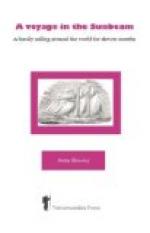Shortly afterwards there were seen from the masthead crowds of natives among the trees armed with long spears, bows, and arrows, busily engaged pushing off their canoes from their hiding-places in creeks and hollows; so perhaps it was just as well we did not stop, or we might have been surrounded. Not far from here are the English Narrows, a passage which is a ticklish but interesting piece of navigation. A strong current prevails, and, to avoid a shoal, it is necessary at one point to steer so close to the western shore that the bowsprit almost projects over the land, the branches of the trees almost sweep the rigging, and the rocks almost scrape the side of the vessel. Two men were placed at the wheel, as a matter of precaution, and we appeared to be steering straight for the shore, at full speed, till Tom suddenly gave the order ‘Hard a-port!’ and the ‘Sunbeam’ instantly flew round and rushed swiftly past the dangerous spot into wider waters. It is just here that Captain Trivett was knocked off the bridge of his vessel by the boughs—a mishap he warned Tom against before we left England.
Whilst in the Narrows we looked back, to see everything bright and cheerful, but ahead all was black and dismal: the sky and sun were obscured, the tops of the mountains hidden, and the valleys filled up with thick fog and clouds—all which seemed to indicate the approach of a storm of rain, although the glass was still very high. We went up South Reach and North Reach, in the Messier Channel, till, just as we were off Liberta Bay, in lat. 48 deg. 50’ S., long. 74 deg. 25’ W., the blackest of the black clouds came suddenly down upon us, and descended upon the deck in a tremendous shower—not of rain, but of dust and ashes. Windows, hatches, and doors were shut as soon as we discovered the nature of this strange visitation, and in about half an hour we were through the worst of it: whereupon dustpans, brooms, and dusters came into great requisition. It took us completely by surprise, for we had no reason to expect anything of the sort. Assuming the dust to be of volcanic origin, it must have travelled an immense distance; the nearest volcano, as far as we know, being that of Corcovado, in the island of Chiloe, nearly 300 miles off. We had heard from Sir Woodbine Parish, and others at Buenos Ayres, of the terrible blinding dust-storms which occur there, causing utter darkness for a space of ten or fifteen minutes; but Buenos Ayres is on the edge of a river, with hundreds and thousands of leagues of sandy plains behind it, the soil of which is only kept together by the roots of the wiry pampas grass. For this dust to reach the Messier Channel, where we now are, it would have to surmount two chains of snowy mountains, six or seven thousand feet in height, and in many places hundreds of miles in width, and traverse a vast extent of country besides.




